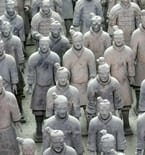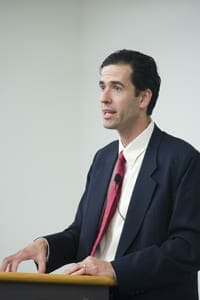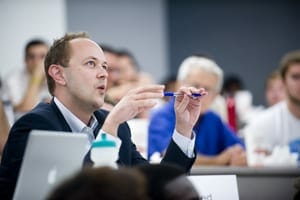By Program

Implications for Liberal Order of Asia’s Rise
September 20, 2011 | 12:15:00 | Sid Richardson Hall Room 3.127

The Robert S. Strauss Center for International Security and Law welcomed Daniel Twining, Associate Senior Fellow for Asia at the German Marshall Fund of the United States, on September 20, 2011. William Inboden, Distinguished Scholar at the Strauss Center, introduced Dr. Twining.

Dr. Twining began by introducing the concept of the “invisible infrastructure.” For years, the U.S. and our allies have produced a liberal order centered on our values, but growing powers could change this infrastructure. Globalization has produced a rise of the rest, creating a wider diffusion of power across the world. Dr. Twining, however, is optimistic. He believes it is better to have strong friends and allies and a distribution of power can bring more stability.
Dr. Twining asserted that we are not moving toward a world ruled by China. While power is dispersing and re-concentrating in Asia, China’s trajectory is more complicated. China faces many speed bumps as it grows. Asian nations are resistant to China’s authoritarian rise. He also cited China’s infrastructure and demographics as weaknesses. Finally, China has placed itself in a “political straightjacket” that is causing internal strife and stunting its potential growth on the international stage.
Dr. Twining argued that trends favor India, a Democratic giant with an enormous youth demographic. He emphasized the growth of India as positive for the U.S. India is not strictly an Asian or western power, but rather a bridging power between the two. Additionally, India’s success will influence China’s internal debate.

Questions from the audience covered the retrenchment debate, offshore balancing, Vietnam’s role as China’s neighbor and how the U.S. can facilitate improvement in the Indian government.
Dr. Daniel Twining is an Associate Senior Fellow for Asia at the German Marshall Fund of the United States. He is also a consultant to the U.S. government on international security affairs. He previously served as a Member of the State Department’s Policy Planning Staff, as Foreign Policy Advisor to Senator John McCain, and as a staff member of the United States Trade Representative. He holds a doctorate in international relations from Oxford University, an MPhil with distinction in East Asian international relations from Oxford, and a BA with highest distinction from the University of Virginia. He is currently writing a book on U.S. grand strategy in Asia after the Cold War.
View the entire presentation below:


